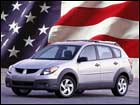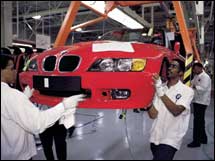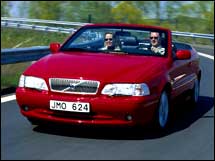
NEW YORK (CNN/Money) -
Many Americans these days feel a renewed sense of patriotism. For some that includes wanting to buy an American car. But what, exactly, is an American car?
You'd be safe with an all-American brand like Jeep, right? Well, not exactly. Since the takeover of Chrysler Corp. by the German company Daimler-Benz, buying a new Jeep is generating profits for headquarters in Stuttgart.
If you want to be sure you are supporting American workers when you buy a car, that isn't so simple either. Increasingly, Japanese-brand cars sold here are built in the U.S. with U.S.-made parts. For example, of Honda's U.S. sales, 80 percent come from U.S. factories with more than 90 percent U.S.-made parts content, according to Honda.
And cooperation between Detroit and Japanese brands has produced some joint models that still carry different brand names and design. The Pontiac Vibe and Toyota Matrix hatchbacks, for instance, are mechanically similar because of an agreement between General Motors and Toyota.
If you really want to drive 100 percent red, white, and blue, you certainly can get U.S.-brand vehicles made in America -- especially larger cars, pickups and sport utilities. The midsize Ford Taurus, for example, has plants in Chicago and Hapeville, Ga. The Chevrolet Silverado pickup is built in a variety of Indiana and Michigan plants. The two top-selling sport utilities -- Ford Explorer and Chevrolet TrailBlazer -- are made in Midwestern U.S. factories. It's easy to check on a model you are considering. Go to the automotive information Web site Edmunds.com, choose a new-car brand and model and then click on the tab labeled Specs and Safety. The factory location for that model is at the top of the page.
Here's a closer look at who's working in the auto industry, who's getting the profits and who's collaborating with their market competition:
Where the jobs are
To cut transportation costs and avoid potential import limitations, Japanese auto companies have opened manufacturing and assembly plants in this country. Honda has about 16,000 autoworkers in their U.S. plants and Toyota 20,000. Nissan, another big Japanese company, has begun building its Frontier pickup truck and Xterra sport utility in Smyrna, Tennessee. Korean manufacturer Hyundai, which has doubled its U.S. sales since 1999, is now building its own plant in Montgomery, Ala.
 |
|
| BMW manufacturing in Spartanburg, S.C. |
Among European manufacturers, BMW builds its Z4 sports car and X5 sport utility in Spartanburg, S.C. And Daimler-Benz, as it did even before its takeover of Chrysler, still makes SUVs in Tuscaloosa, Ala.
For their part, Detroit companies long have had plants in Canada -- especially in the nearby province of Ontario. They then began to expand into Mexico in towns just over the U.S. border. Chrysler's PT Cruiser and the Chevrolet Avalanche pickup/SUV hybrid are built in Mexico.
Where the money goes
 |
|
| Volvo C70 |
It's very nice that Japanese companies hire American workers, critics say, but when you buy a Honda or Toyota, the profits ultimately go back to Japan. But in today's global auto industry, that's not a one-way street. Ford and General Motors have long built and sold cars in Europe, Latin America and parts of Asia. And in recent years, they also have begun acquiring smaller companies. Ford now owns Volvo, Jaguar and Range Rover and has a one-third interest in Mazda. Saab is part of General Motors. So those autoworkers in Sweden or Great Britain are likewise generating profits for far-off corporate headquarters -- this time in Detroit.
Working together
In this brave new global world, joint agreements among competitors result in essentially the same vehicle being sold with both Japanese and American brand names. General Motors and Toyota have a cooperative manufacturing agreement in a plant in Fremont, Calif. This dates back to 1984 when Toyota wanted to start manufacturing in this country and GM hoped to learn from Toyota's manufacturing methods. That earlier cooperation led this year to the joint development, from a Toyota Corolla mechanical platform, of the Pontiac Vibe and the Toyota Matrix.
This article was originally published in June, 2002 and has been updated for re-publication.

|

